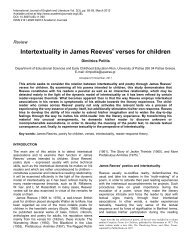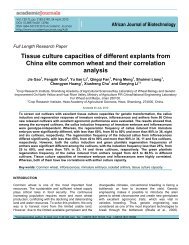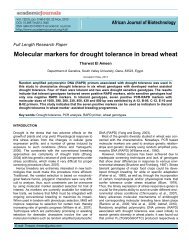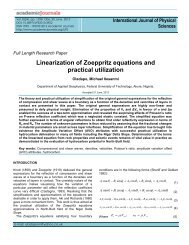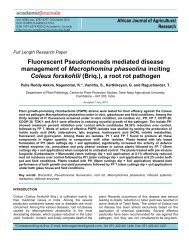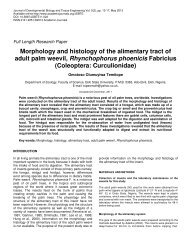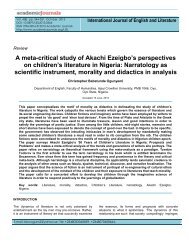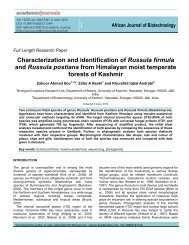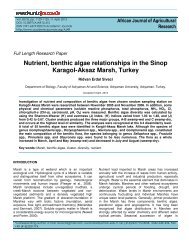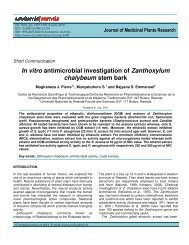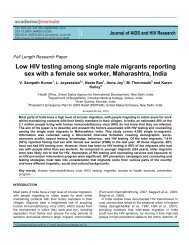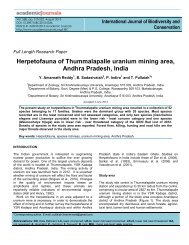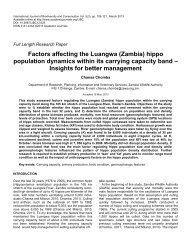Download Complete Issue (4740kb) - Academic Journals
Download Complete Issue (4740kb) - Academic Journals
Download Complete Issue (4740kb) - Academic Journals
You also want an ePaper? Increase the reach of your titles
YUMPU automatically turns print PDFs into web optimized ePapers that Google loves.
Table 2. Count’d.<br />
Psydrax livida<br />
Spirostachys africana<br />
Hexane<br />
Acetone<br />
Methanol<br />
Dichloromethane<br />
Hexane T2<br />
Acetone<br />
Methanol<br />
Dichloromethane<br />
Hexane<br />
Gentamycin 1.56 x 10 -3<br />
Mukandiwa et al. 4383<br />
T2 0.625 0.625 0.156 0.313<br />
T1 2.5 1.25 0.625 1.25<br />
T2 2.5 1.25 0.625 1.25<br />
T1 0.313 0.078 0.313 0.156<br />
T2 0.313 0.313 0.156 0.078<br />
T1 0.313 1.25 0.313 1.25<br />
T2 0.313 1.25 0.625 0.625<br />
T1 0.156 0.156 0.313 0.156<br />
T2 0.313 0.156 0.313 0.078<br />
2.5 0.313 0.313 1.25<br />
2.5 0.625 0.313 1.25<br />
T1 0.156 0.156 0.156 0.156<br />
T2 0.156 0.156 0.156 0.156<br />
T1 0.313 0.625 0.313 0.313<br />
T2 0.313 0.625 1.25 0.313<br />
T1 0.313 0.313 0.313 0.313<br />
T2 0.313 0.625 0.313 0.313<br />
T1 0.625 2.5 0.313 1.25<br />
T2 0.625 2.5 0.313 2.5<br />
3.9 x10 -4<br />
1.56 x 10 -3<br />
7.8 x 10 -4<br />
Acetone >2.5 >2.5 >2.5 >2.5<br />
mg/ml or less to be significant antibacterial activity based<br />
on the guidelines in the Phytomedicine Journal<br />
(Instruction to Authors). Only 4 out of 28 extracts had<br />
MIC values equal to or less than 0.16 mg/ml against E.<br />
coli. Nine of the 28 extracts, 11/28 and 8/28 of the plant<br />
extracts had MIC values equal to or less than 0.16 mg/ml<br />
against E. faecalis, P. aeruginosa, and S. aureus,<br />
respectively. Most of the plant extracts were active<br />
against both Gram-negative and Gram-positive bacteria.<br />
In 25/28 analyses (89%) hexane extracts had relatively<br />
poor activity (1.25 to 2.5 mg/ml) or no antibacterial<br />
activity at the highest concentration tested (2.5 mg/ml). In<br />
total, 13 extracts (46%) had MIC ≤ 0.16 mg/ml, of which 6<br />
were acetone extracts, 5 were dichloromethane extracts<br />
and 2 were methanol extracts. The antibacterial activity of<br />
the plant extracts against both the Gram-positive and<br />
Gram-negative bacteria varied with the solvent used to<br />
extract the plant material (Table 2). As expected, the<br />
negative control, acetone, was devoid of any antibacterial<br />
activity.<br />
The MICs for each extract type, that is, methanol,<br />
acetone, dichloromethane and hexane, were averaged<br />
for the four test organisms. The average activity volumes<br />
indicating to what volume 1 mg of extract from different<br />
extractants can be diluted and it would still kill the<br />
bacteria were determined by dividing 1 mg by the<br />
average MIC for each extract type. Figure 1 shows the<br />
average activity volumes of the different extractants.<br />
Acetone is clearly the best extractant, followed by<br />
dichloromethane, methanol and finally hexane. These<br />
results confirm many observations in our laboratory that<br />
the most active antimicrobial compounds have an<br />
intermediate polarity. On average 1 mg of the acetone<br />
extracts can be diluted in 4.2 ml and still kill bacteria<br />
whilst those of hexane can only be diluted in 0.8 ml.<br />
To establish the plant species with the highest activity,<br />
the total activity of the different plant species was also<br />
determined. Total activity indicates the largest volume to<br />
which the biologically active compounds in 1 g of plant<br />
material can be diluted and still inhibit the growth of<br />
bacteria. It is calculated by dividing the quantity of<br />
material extracted from 1 g of dried plant material in<br />
milligrams by the minimal inhibitory concentration in<br />
mg/ml. It is useful to compare the potency of different



